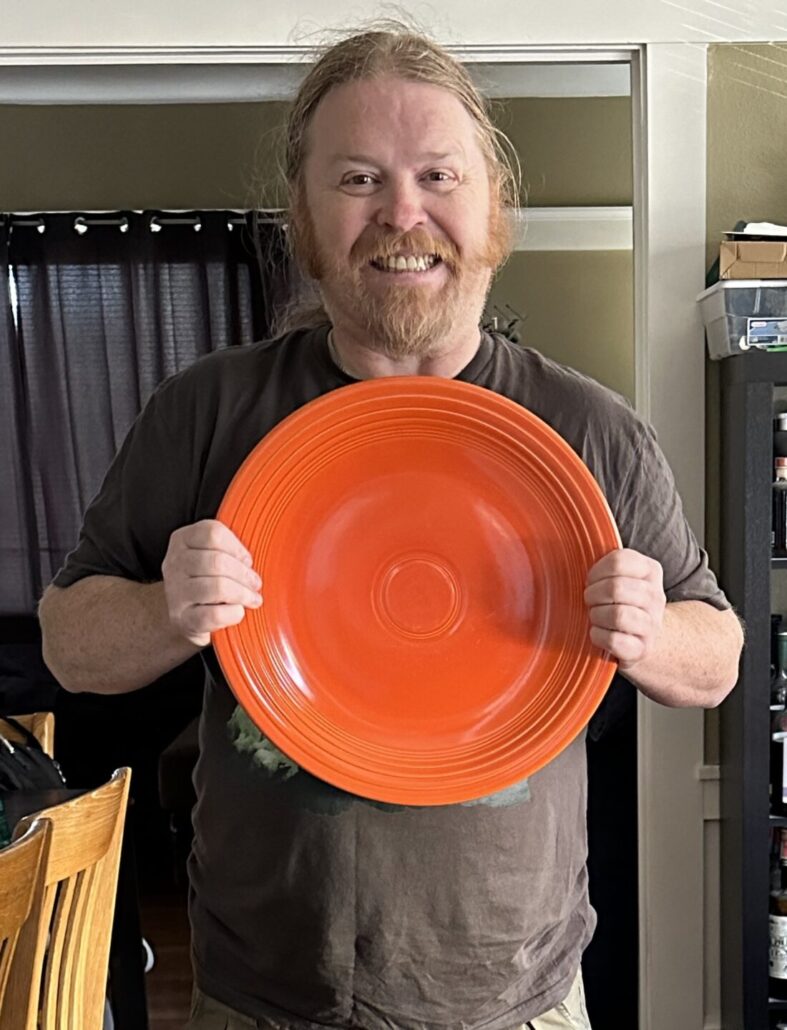Sometimes there are treasures that are worth driving 2000 miles for. I had to write this post first to help explain why it was worth making this trip.
In the autumn of 2022, I lamented the destruction of a precious object. As a health physicist, I am also a member of the the local chapter of the Health Physics Society. One of the many things that local chapters do all over the nation is educational outreach, where members go out to schools and do practical demonstrations of ionizing radiation & detection concepts. This is known as the Radiation Roadshow and our demo kit for it came with a variety of meters and radiation sources. The most important one was the giant red-orange Fiestaware turkey platter that was large enough to function as a planar source so that you could easily demonstrate inverse square law detection principles across an entire classroom. Seriously, very obvious changes in the number of clicks on the GM meter as you approached it from a distance of 10m away.
One day in 2019, colleagues went to retrieve the kit to go out to a local middle school and discovered the platter hopelessly, irreparably shattered. No idea how it happened but it was gone and without the platter the demo loses a lot of its strength. And thus the Radiation Roadshow stopped. :(
I had lamented the loss regularly, but that day in 2022 a brave soul, Jackson, spoke up and said “Shit, there’s stacks of those near where I live. How many do you want?” My honest answer was “All of them. Each platter is the core of another roadshow kit I can make. I will fly out to Kansas and drive back with them all because if they’re gonna break in transit I am going to be the one who breaks them.” I was not going to trust the precious platters to USPS, UPS, or FedEx and I sure as hell didn’t trust the airlines. The last time I found a precious Fiestaware item, it sat in my lap as my personal item all the way home from Fairbanks, AK.
And so, Jackson went forth to Abilene, KS to hit up the antique stores to buy them all. Alas, they were all gone but there was a Revigator and did I want it…
Me: I’ve never seen one outside of a museum. How much?
Jackson: $400
Me: Ouch. If you can talk them down to $300 hell yeah.
Jackson: Already got it for you for $250.
Me: Do you mind holding on to it for me for a bit until I can come get it?
Lucky for me, Jackson’s basement is full of treasures that need to be hidden from kitties and there was room for my Revigator. I’m glad there was because it took me until August 2023 to actually get out there to pick it up. Now you may ask, “Phil, why didn’t you just have Jackson ship it to you?” As we have previously discussed in this post, you can totally ship naturally occurring radioactive material and generally licensed radioactive sources. However, because this is an even rarer antique than the platters, I elected to stay with the option “I WILL DRIVE 4EVA 4 ROCK” and do the iron ass challenge to get my Revigator home. I mean, just look at this beauty.
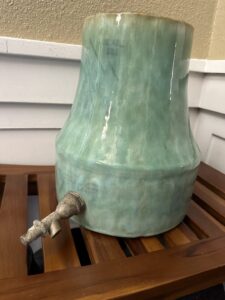
As many people asked at the time “Why would you want that? Is it safe to have in your house?” I want it because I have a weird love for radiological medical quackery and pseudoscience theories related to Vital Energies and my collection is far from full. As to it being safe, go back and read the Fiestaware & Uranium Glass post again. It’s fine, a count rate indistinguishable from background on the outside, though I wouldn’t recommend drinking the “revigated” water nor huffing the inside of the stoneware jug as you can see here.
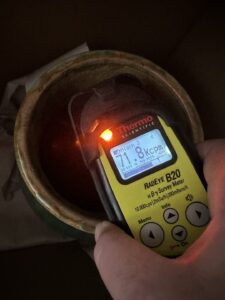
The reason you have such a high count rate inside but nothing on the exterior is because the ceramic has a layer of uranium ore on the interior that is constantly evolving radon, which is primarily an alpha emitter. Eau d’Radon is something we generally try to avoid, but if you really need to try it out just hang in an unventilated basement in Michigan for a bit.
But there is more than a Revigator to share from this trip. It was merely the reason for the trip to start in Manhattan, KS. Kansas contains a remarkable amount of nuclear history, not the least of which being that we decided to put a good chunk of our ICBMs there. But before we had ICBMs we had bombs and they belonged to the Air Force. This made the other branches sad and they wanted nukes of their own. This is how we got the Army’s atomic artillery, the M65, which you may remember from watching clips of the Upshot-Knothole Grable test. Let’s watch it again because they’re a helluva thing (we’ll skip the longer extra propaganda-y one).
There is a park opposite of the main entrance to Fort Riley in Junction City, KS that has one at the very top of a hill of other artillery pieces. It is not the “Atomic Annie” used in the video above, which is on display at Fort Sill in Oklahoma, but one of a handful of surviving specimens of the M65. By apocryphal tale, it is aimed toward Eisenhower’s former home in Abilene, KS. (NOTE: there is no way it could ever have fired that far.) It’s worth seeing it while you can, as folks have been pillaging it for scrap metal with a side order of vandalization. People need better hobbies but it’s tough being a teen and/or E-1, so a 70 year old hunk of metal gets the business.
Of course, there are still silos around. I will leave it to the geoguessers to figure out which one exactly this is. Because signal was so awful, my phone was unable to log the location with the photo so I can’t really tell you if your guess is right either.
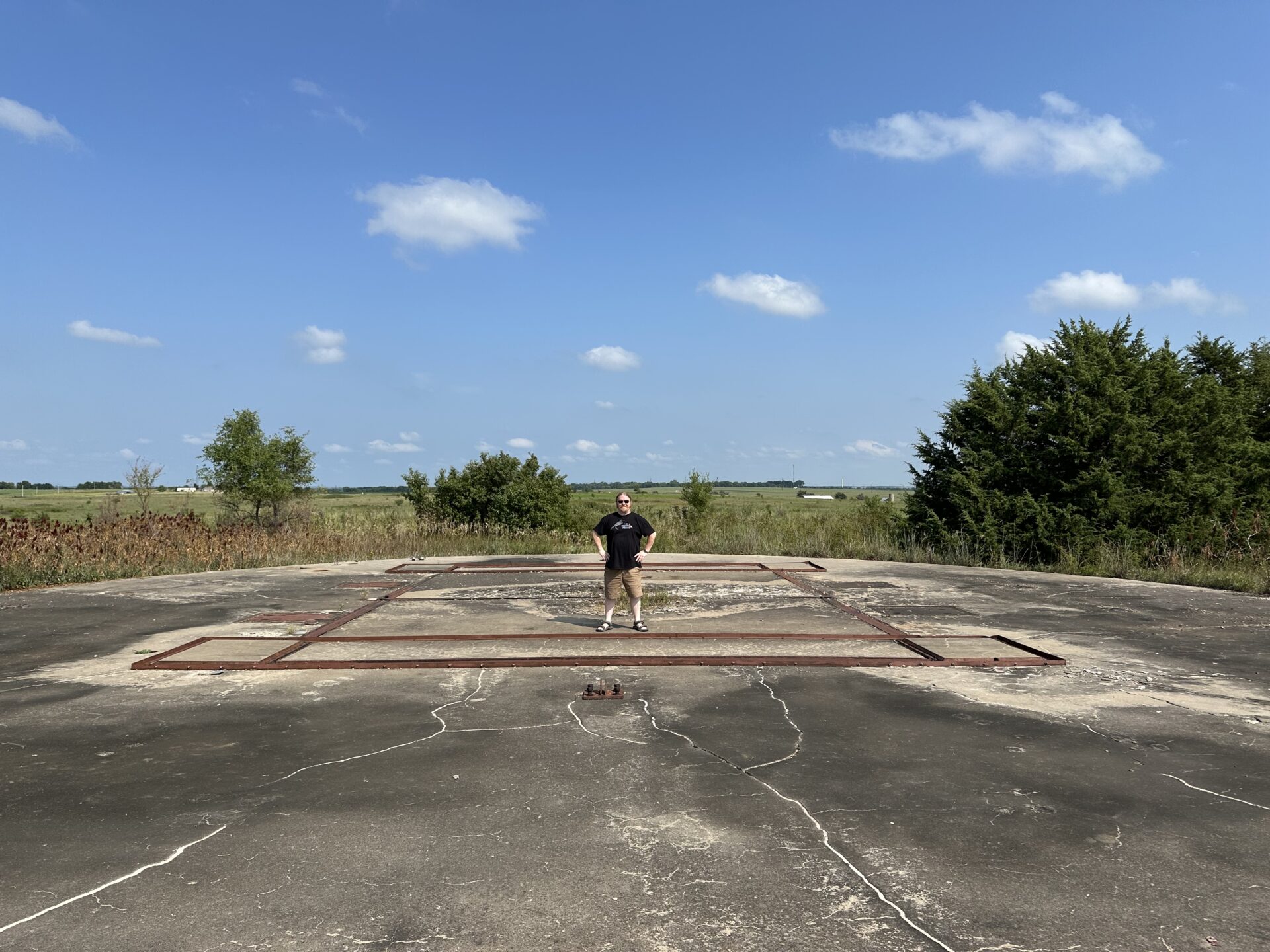
But then the long drive home had to begin. While one could, theoretically, do this drive in single go I am not a young resilient idiot anymore and I didn’t have a relief driver. Luckily, I had folks to visit along the way and old promises to fulfill. In the long ago, my introduction to the paleontology community on social media came from two things: answering the question “What’s your favorite dinosaur?” and curator concerns about fossils from the Morrison Formation. The answer to the first question was “I’m more of a mosasaur kind of guy” and that is how I got introduced to Anthony Maltese, the curator at the Rocky Mountain Dinosaur Resource Center, AKA @mosasaurologist. In addition to being The World’s #1 Xiphactinus Superfan, Mr. Maltese is responsible for some of the more dynamic articulations of fossils you’ve seen on display in museums around the world. I would be lying if I said my inner six year old wasn’t jumping up and down in squealing delight to get to go behind the scenes and check out fossils in his office. Because one of the things I was there to do was to make an assessment of just how radioactive all the things he had in there, collected from the Morrison and other interesting formations, might be. And GOOD NEWS his office is not a radon bath, though we were a bit surprised about some of the specimens that were reading above background.
(ASIDE: I need to add two extra bits of knowledge to your mind. First, we don’t mine for uranium like we do gold. There’s no uranium veins or a uranium mother lode to trace. Yes, there are igneous uranium-rich ores that are the source material but we depend on plants to extract, bioaccumulate, die, decompose, and wash away to concentrate uranium over untold millions or billions of years. This is why when we go mining uranium, we’re usually looking for sedimentary rocks of former swamps and wetlands, not igneous rocks. It’s also why burning coal and natural gas further concentrates residual uranium and daughters to make descaling maintenance operations have surprisingly high dose rates. Second, and this might seem dumb, you don’t go looking for fossils in igneous rocks. You might find trace fossils, AKA the leftovers when lava incinerates a living thing and leaves an impression, but nothing like mineralization.)
This is where students usually get exasperated with me and the world for telling them that some fossils are radioactive, with some being noticeably more radioactive than other similar fossils from the same period but in different rock formations. The world is an amazing and complicated place. This is some handwaving biology and geology, but you can get radioactive fossils a couple of different ways and, to be clear about the radioactivity, we’re talking uranium/thorium and daughters here:
- While alive, your fossilized critter bioaccumulated a higher than normal amount of radioactive material into its bone/shell/hard bits that endured through mineralization.
- The general environment where the critter’s remains came to rest had enough radioactive material around that it got incorporated into the fossil during mineralization.
- Radioactive materials found the fossil surface a good place to deposit out from the ambient sedimentary formation.
- The matrix material the fossil is in is oddly full of radioactive materials and it’s just messy contaminating everything.
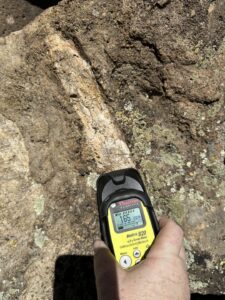
It’s hard to functionally tell 1 & 2 apart but 3 & 4 are much easier to discern. If you’ve ever had the pleasure of seeing a piece of carnotite, you’ve see the situation from 3 & 4 where all the uranium sort of plates itself out onto the surface of sandstone in a very crumbly yellow mineral. But the uranium could also go for the surface of the fossil rather than the surface of sandstone. For Mr. Maltese’s specimens, it appears that those select specimens either has residual uranium containing matrix or that some surficial plating of uranium compounds onto some part of the fossils happened. Very cool, but also not what either of us were expecting. We expected bulk radioactive fossils as had been documented in other fossils from the Morrison. Nothing to do but go seek out the fossils in their natural habitat! By which, I mean go hiking for a bit to find dinosaur fossils just staring you in the face from rocks of the Morrison Formation. I, once again, have to give Mr. Maltese thanks for making Li’l Phil’s dreams come true. I am very proud of myself for not falling off the rock outcrop while I used my meter because I am a professional.
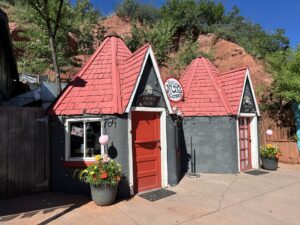
But that’s not the end of the radiation fun in Colorado, goodness no, because the next stop is Manitou Springs. It feels like such a familiar place to me because it has very strong tourist town vibes like the Santa Cruz Mountains I grew up in. But more than that, it’s as if the burnouts of the 1960s split into two tribes where one decided to surf and hike and ended up in Santa Cruz & Marin, while the others who liked to ski and hike ended up in Manitou Springs & Vail. Like all resort towns, it has had to evolve with times and making sure their core attractions still appeal. Santa Cruz and the San Lorenzo Valley weren’t spas but they did offer the “tree & sea” therapy to try to help people clear their lungs from foul city air and swim in the bracing waters of the Pacific Ocean. Manitou Springs began as a mineral springs spa with a side order of the ever popular medical sales pitch of dry, mountain air to help people with tuberculosis. The hotel attached to the sanitarium/spa did not actually want the TB patients in the hotel, but they did want their money, so they built shacks for them to live in and delivered food to. A few of the shacks are still around downtown.
The other thing that is still all over town from those early days are the fountains from all the springs. Manitou Springs is a hydrological oddity in that it has a variety of springs each seem to have a different predominant chemical composition other than the high baseline manganese in all of them. Don’t worry, they’re all well posted and often have beautiful civic architecture to make a sip enjoyable, if uncreatively named. Soda Springs dispenses high CO2 water. Lithium Springs has that feel good hit of lithium. Then there was this ugly scar of concrete in a little pavilion area where a fountain clearly had once been.
Anthony: Wanna guess what that used to be?
Me: That was Radium Springs, wasn’t it?
Anthony: It’s like you know how this works.
As I’ve discussed in several previous posts, just because humanity didn’t know what radiation is doesn’t mean we haven’t always had a relationship with it. In the case of radon, this was part of the mix of “plutonic emissions” where people would take the vapors for curative or oracular purposes. Nothing like a little bit of oxygen deprivation, olfactory nerve deadening, and lung dose to really bring the visions on. This has always been a selling feature of visiting mineral water spas, to either drink the waters or immerse yourself in them, as these waters had clearly absorbed vital energies from the underworld and you could absorb them to be as healthy and strong as Achilles. Which brings us full circle to the reason this trip started in the first place, the Revigator. It offered people the ability to have the health enhancing effects of the radon water from the spas in your very own home at a fraction of the cost! What a bargain! How convenient!
Which is one of my old refrains: The bullshit never changes because, down through the years, people remain people. Only what we apply the bullshit to changes.
Incidentally, within a couple weeks of getting home, I was able to get ahold of one of the red-orange Fiestaware platters. The Radiation Roadshow Kit is reborn!
